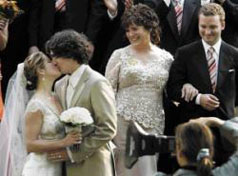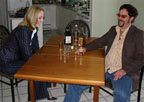Wednesday, 01 June 2005
 The members of the 38th Parliament of Canada have returned to Ottawa "for what is scheduled to be the final four weeks of the spring session." And the "Conservatives say they will attempt to block the government's two budget bills from being passed before the House of Commons summer recess." Conservative leader Stephen Harper has indicated as well "that his party may make further attempts to force an election, although he doubts they would succeed as long as the NDP supports the Liberals." So things are not exactly getting back to normal in the capital city. And it is becoming hard to avoid the thought that some new and extended quiet crisis in Canadian politics may have begun at last. The members of the 38th Parliament of Canada have returned to Ottawa "for what is scheduled to be the final four weeks of the spring session." And the "Conservatives say they will attempt to block the government's two budget bills from being passed before the House of Commons summer recess." Conservative leader Stephen Harper has indicated as well "that his party may make further attempts to force an election, although he doubts they would succeed as long as the NDP supports the Liberals." So things are not exactly getting back to normal in the capital city. And it is becoming hard to avoid the thought that some new and extended quiet crisis in Canadian politics may have begun at last.
But not to worry. On the bright side, "Canadian brunette Natalie Glebova" has just been "crowned Miss Universe 2005" in Bangkok, and Justin Trudeau has finally made an honest woman out of Sophie Grégoire. (Meanwhile, if you must listen to Conservative Gurmant Grewal's tapes of his conversations with assorted Liberal emissaries, you can do it here. But don't expect to learn much of consequence. And how is this different from Belinda Stronach again? Also this is probably the last day to look at Clifford Kraus's recent unflattering article about Canada in the New York Times — for free.)
(For more on Gurmant Grewal and all that see the latest counterweights report on The Grewal Tapes. For the latest antics in Canadian federal politics see The Plot Thickens.)
The new struggle in the House
 The political theatre in Ottawa may not be quite as dramatic over the next four weeks as it has been over the past six weeks. The Liberals’ two latest bold acts of survival, on May 19 and May 24, have stiffened their position somewhat. The political theatre in Ottawa may not be quite as dramatic over the next four weeks as it has been over the past six weeks. The Liberals’ two latest bold acts of survival, on May 19 and May 24, have stiffened their position somewhat.
As Mr. Harper has allowed, forcing an election at this point will be even a bit more of a stretch than before — at least "as long as the NDP supports the Liberals." Yet even here the Conservatives do seem to be planning tactics that might, among other things, divide and conquer the current Liberal-New Democrat budget alliance.
Just to cover the raw parliamentary power-mongering quickly, the two budget bills that finally passed so-called second reading on May 19 must make still further progress through the legislative labyrinth. The next step, starting today, Tuesday, May 31, is that they have to get through the House finance committee.
As it happens, the Conservatives and the Bloc Quebecois have a majority on the finance committee in the 38th minority Parliament. And it would seem that they could easily enough keep the budget bills tied up in a rigorous finance committee investigation, until the start of the summer recess on June 23.
 Still more to the point, echoing their position on May 19, the Conservatives are apparently prepared to let budget Bill C-43 — the original budget before the Liberal-NDP alliance to avoid an election now — through the finance committee with some dispatch. But any thought that they will do the same favour for the much shorter Bill C-48 — the NDP amendments to the original budget — is, according to Tory House leader Jay Hill, "a dream in technicolour." Still more to the point, echoing their position on May 19, the Conservatives are apparently prepared to let budget Bill C-43 — the original budget before the Liberal-NDP alliance to avoid an election now — through the finance committee with some dispatch. But any thought that they will do the same favour for the much shorter Bill C-48 — the NDP amendments to the original budget — is, according to Tory House leader Jay Hill, "a dream in technicolour."
More to the point again, if the Grits were foolish enough to finally run with just the Bill C-43 that the Tories are prepared to deal with promptly — in an effort to honour "Liberal pledges to pass the budget before the June 23 summer recess" — NDP finance critic Judy Wasylycia-Leis has made clear that this "would end the NDP's support of the government."
In the perhaps still unlikely event that anything of this sort should happen before June 23, the New Democrats might conceivably be prepared to join the Conservatives and the Bloc Quebecois in voting for a fresh election sooner rather than later. (And NDP leader Jack Layton "has threatened to withdraw his party's support if the budget is not passed soon," though he has also "called for the Commons to sit into the summer if needed.")
Do deeper meanings now loom on the horizon?
 Given the latest opinion polls, showing the Liberals considerably ahead of the Conservatives Canada-wide, at this particular moment, the wily Grits in Ottawa may themselves be happy enough to have a fresh election forced on them at some point over the next four weeks. Given the latest opinion polls, showing the Liberals considerably ahead of the Conservatives Canada-wide, at this particular moment, the wily Grits in Ottawa may themselves be happy enough to have a fresh election forced on them at some point over the next four weeks.
Another uncertainty about the near future right now is that, as the Globe and Mail has reported, the Bloc Quebecois "has yet to spell out what position it will take in" the House finance "committee on the budget measures." (The test, Bloc leader Gilles Duceppe did clarify on Monday, will be what is best for Quebec.) And carrying on with yet another key theme of the recent past, without the Bloc’s collaboration the Conservatives do not themselves have a majority even on the 38th Parliament’s finance committee.
On some strict conventional ideological or right-left reading, it is at least arguable that the Bloc might look more kindly on Bill C-48 than it does on Bill C-43 — or just the reverse of the declared Conservative position. (As is sometimes said in Toronto, Gilles Duceppe was virtually a communist in his youth.)
This may be as good a point of departure as any other for wondering about just what deeper meanings there may or may not be for Canadian federal politics, beneath all the current parliamentary power mongering.
It is one thing to say that the Liberals just want to stay in power, and the Conservatives just want to get there (while both the Bloc and even the NDP finally just want to increase their parliamentary representation in a fresh election). This is just the sordid and essentially technical game of politics that always goes on among even duly elected democratic politicians — and is finally of great and passionate interest only to them.
 Yet it is also becoming increasingly more difficult to explain just what has been going on in Canadian federal politics over the past several weeks now, without going at least somewhat beyond the perennial power struggle between the ins and the outs. The Bloc Quebecois, as almost everyone knows, has not been supporting the Conservatives as staunchly as it has because it agrees with even their somewhat mild and moderate Canadian version of the right-wing neo-con economic gospel in North America (or even all of the English-speaking world). Yet it is also becoming increasingly more difficult to explain just what has been going on in Canadian federal politics over the past several weeks now, without going at least somewhat beyond the perennial power struggle between the ins and the outs. The Bloc Quebecois, as almost everyone knows, has not been supporting the Conservatives as staunchly as it has because it agrees with even their somewhat mild and moderate Canadian version of the right-wing neo-con economic gospel in North America (or even all of the English-speaking world).
The Bloc has been supporting the Conservatives, to put the matter circumspectly, because it believes that their more decentralized and "provincialist" conception of the Canadian federation is more in the sovereign province of Quebec’s interest, than what the Quebec sovereigntist movement has always seen as the rampant centralism of the Liberals in Ottawa, still haunted by the legacies of the aggressively federalist French Canadian, Pierre Trudeau.
 (Oh, and interesting by the way that just this past weekend Justin Trudeau finally married his girlfriend Sophie Grégoire — at a Montreal wedding complete with a Mountie honour guard. Justin and his new bride left the church of Sainte-Madeleine d'Outremont in his father’s old Mercedes-Benz coupe, with the top down, on a nice spring afternoon. And they were both dressed in elegant but unusual wedding clothes, that must have had the father of Canada’s Constitution Act 1982 smiling with approval in his grave.) (Oh, and interesting by the way that just this past weekend Justin Trudeau finally married his girlfriend Sophie Grégoire — at a Montreal wedding complete with a Mountie honour guard. Justin and his new bride left the church of Sainte-Madeleine d'Outremont in his father’s old Mercedes-Benz coupe, with the top down, on a nice spring afternoon. And they were both dressed in elegant but unusual wedding clothes, that must have had the father of Canada’s Constitution Act 1982 smiling with approval in his grave.)
A largely benign quiet crisis in Canadian politics at last?
 From here one can of course go on still further, into such things as the various diverse regionalisms of East and West, in a country that still has, as its longest-serving prime minister William Lyon Mackenzie King once complained, "too much geography." From here one can of course go on still further, into such things as the various diverse regionalisms of East and West, in a country that still has, as its longest-serving prime minister William Lyon Mackenzie King once complained, "too much geography."
Or the growing great divide between a new urban and a new rural Canada (that has at least a few things in common with the parallel North American divide between blue-state and red-state USA).
 Or the inevitable kinder and gentler Canadian tensions among older and newer aboriginal peoples of Canada, French peoples, British peoples, Other European peoples, African peoples, various Asian peoples, and now Latin American peoples too — all part of the new bilingual and multicultural Canada that Pierre Trudeau also did so much to help set in motion in the early 1970s. (And remember: Justin and his younger brother Alexandre [a.k.a. Sacha] Trudeau’s father was from Montreal, Quebec but their mother is from Vancouver, BC. And for the wedding "Pierre Trudeau's 1960 Mercedes Benz 300 SL roadster ... was shipped from a BC auto restorer to Montreal.") Or the inevitable kinder and gentler Canadian tensions among older and newer aboriginal peoples of Canada, French peoples, British peoples, Other European peoples, African peoples, various Asian peoples, and now Latin American peoples too — all part of the new bilingual and multicultural Canada that Pierre Trudeau also did so much to help set in motion in the early 1970s. (And remember: Justin and his younger brother Alexandre [a.k.a. Sacha] Trudeau’s father was from Montreal, Quebec but their mother is from Vancouver, BC. And for the wedding "Pierre Trudeau's 1960 Mercedes Benz 300 SL roadster ... was shipped from a BC auto restorer to Montreal.")
Or even all the constitutional loose ends that Canadians no doubt wisely left dangling again, with the failure of the Charlottetown Accord in 1992, and then the almost successful second Quebec sovereignty referendum of 1995 (which wasn’t exactly about Quebec independence anyway, but never mind that for the moment) — which then led to Jean Chretien’s Quebec sponsorship program (which has finally led to where we seem to be right now?).
 Six weeks ago, it still seemed to many of us that Canada was still not quite ready to return to all the divisive issues about the deepest roots of the country, and move ahead on them as it ultimately must, if it is going to properly survive the 21 st century in some suitable style. Things may still seem this way today. But it also seems a little more likely that we are going to get into them again anyway, over the weeks, months, and even perhaps the next few years ahead. Six weeks ago, it still seemed to many of us that Canada was still not quite ready to return to all the divisive issues about the deepest roots of the country, and move ahead on them as it ultimately must, if it is going to properly survive the 21 st century in some suitable style. Things may still seem this way today. But it also seems a little more likely that we are going to get into them again anyway, over the weeks, months, and even perhaps the next few years ahead.
 Despite the sometimes appalling parliamentary behaviour, it may even be that Canadians are somewhat better prepared for yet another struggle with the mountain of their own existence than they were a decade ago, on the eve of the second sovereignty referendum in Quebec. Who knows? Maybe Wilfrid Laurier was only out by a century when he said the 20th century belongs to Canada? (And, just to get things started, winning Miss Universe 2005 has got to be a good sign.) Or maybe this time we the people of Canada will at least be able to enjoy ourselves, as our politicians keep on struggling to move the country to its ultimate free and democratic destiny, whatever that might finally prove to be? Despite the sometimes appalling parliamentary behaviour, it may even be that Canadians are somewhat better prepared for yet another struggle with the mountain of their own existence than they were a decade ago, on the eve of the second sovereignty referendum in Quebec. Who knows? Maybe Wilfrid Laurier was only out by a century when he said the 20th century belongs to Canada? (And, just to get things started, winning Miss Universe 2005 has got to be a good sign.) Or maybe this time we the people of Canada will at least be able to enjoy ourselves, as our politicians keep on struggling to move the country to its ultimate free and democratic destiny, whatever that might finally prove to be?
(And hats off to Gordon Beck of the Montreal Gazette for the photo of Trudeau’s 1960 Mercedes.) Only registered users can write comments.
Please login or register. Powered by AkoComment 1.0 beta 2!
|
